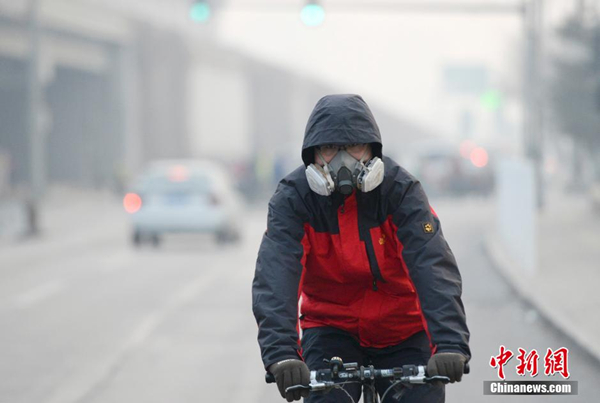Restrict traffic to help fight pollution
- By Murad Qureshi
 0 Comment(s)
0 Comment(s) Print
Print E-mail China Daily, October 29, 2014
E-mail China Daily, October 29, 2014
The Chinese government's response to the smog covering Beijing before the Asia-Pacific Economic Cooperation meeting on Nov 5-11 gives me a sense of déjà vu, albeit of a positive kind. Remember the 2008 Olympic Games and the media storm created over the air quality in Beijing before blue skies greeted athletes and officials a day prior to the opening ceremony? No athlete's performance was affected by the city's air quality, as traffic flowed freely.
|
|
|
A cyclist wears a mask to protect himself from heavy smog in Beijing. [Photo/CNS] |
The Chinese leadership has emphasized the importance of taking measures to deal with the smog during the APEC meeting. Beijing authorities announced a yellow alert for severe smog and air pollution with PM2.5 at more than 500 micrograms per cubic meter. They also have imposed strict vehicle control, encouraged residents to take public transport and declared a six-day holiday to keep the skies clear.
Similar measures were taken during the Beijing Olympics to improve the city's air quality. This was essentially achieved by providing better and cheaper public transport and implementing the odd-even license plate restrictions that allowed car owners to drive only on alternate days. Apart from closing down factories in the Beijing-Tianjin-Hebei region, the authorities introduced cheaper fares and stricter traffic control measures during the Olympics, which helped increase the proportion of Beijing residents using public transport from 35 percent to 45 percent. Standard bus fares were reduced by up to 60 percent for ordinary commuters and 80 percent for students, and the fare for a single subway ride was slashed to 2 yuan ($0.32).
Keeping the 2008 measures in mind, one could say the arrangements for the APEC meeting will cause some inconvenience to Beijing residents. But the six-day holiday will offer them some respite to go about their life in a normal way. And since this is something not many Western countries hosting major conferences have been able to offer to their citizens, many observers will closely watch this experiment to see whether it has any knock-on effects on the economy.
Yet car ownership in Beijing is still growing by about 200,000 a year. The only solution to this challenge is the continuous development of the city's public transport system along the lines already implemented by the authorities, but with one important addition - charging for traffic congestion. This will ration road space by price, so that the marginal cost of an additional trip by a car owner will be paramount in his/her mind.
The introduction of such a scheme in London in 2004 by Ken Livingstone, then mayor of London, reduced the number of vehicles entering the central part of the city by 70,000 a day. This has produced real benefits for the city, not only by cutting key traffic pollutants but also by improving public transport capacity and performance, and reducing road traffic casualties.
I have always argued that the geography of Beijing, with its five ring roads, would lend itself very easily to congestion charging. A congestion charge zone could be introduced within either the Second or Third Ring Road at the beginning and then extended outward depending on the success of the scheme and public demand for it.
As in London, to win public support, the funds raised from the congestion charges would have to be reinvested in public transport, and some exemptions or at least discounted rates need to be given to residents within the zones. This also would be consistent with the government's focus on people-centered and scientific methods of development.
The author is deputy chair of the Environment Committee, London Assembly.






